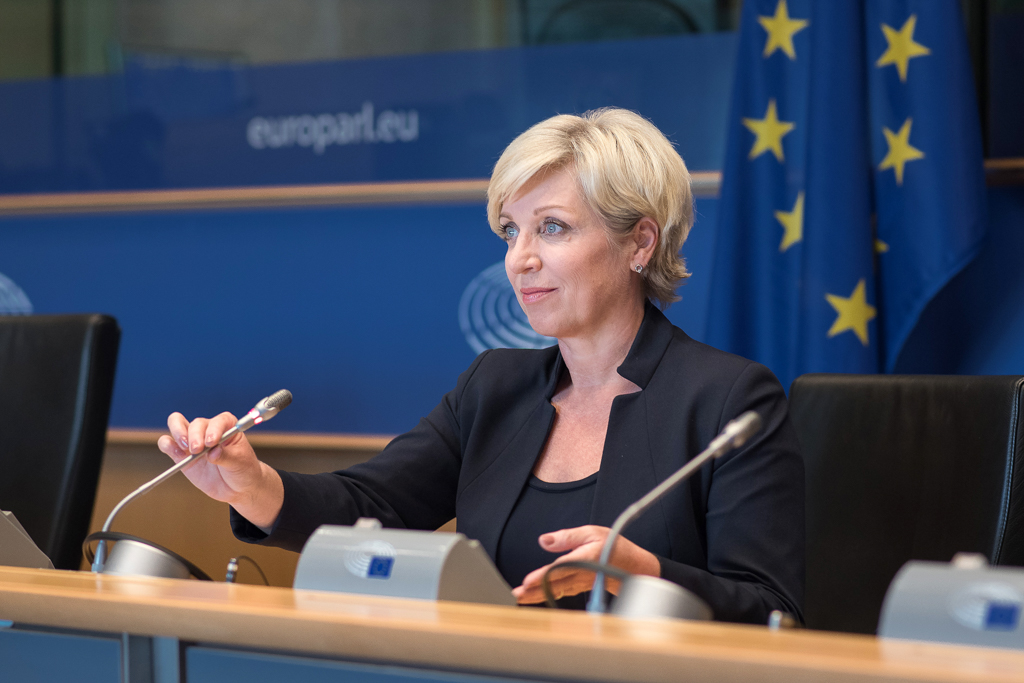By: Sara Rančigaj /Nova24tv
The Prime Minister Janez Janša presented the priorities of Slovenia’s presidency in the European Union in the European Parliament. Janša addressed all the fundamental current issues and problems facing Europe, and he considers recovery and resilience to be key priorities. While slandering one’s own country is not exactly common in the European Parliament, Fajon’s speech was openly opposed to her own country. “They are behaving aggressively towards their own country, especially at the beginning of the presidency, and considerable number of European colleagues were surprised at this,” said Romana Tomc, MEP.
In Strasbourg, Prime Minister Janez Janša presented the priorities of the 6-month presidency of the Council of the European Union. He presented recovery and resilience as key priorities. He also emphasised the importance of equal rules on balanced rights and responsibilities, high protection of human rights and fundamental freedoms, including the right to freedom of expression. Janša also emphasised the importance of a secure union capable of ensuring security and stability in the neighbourhood. The Prime Minister also touched on NATO-related issues and presented a conference on the future of Europe as a priority.
During its presidency, Slovenia will pay special attention to media freedom and pluralism. With regard to the Western Balkans, he expressed the hope that there would be concrete breakthroughs towards greater integration and integration of some Western Balkan countries into the European Union. Janša also answered a question from journalists. Regarding the appointment of European delegated prosecutors, he emphasised that Slovenia was not withdrawing from the system, but that the system of our domestic legislation had become complicated. Regarding the situation in Slovenia, the Prime Minister wants the representatives of the European Commission to visit Slovenia and look at the picture, which most of them show one-sidedly.
Manfred Weber called on Slovenia to immediately appoint delegated prosecutors, while other criticisms fell mainly from left wing MPs, including MEP Tanja Fajon. Fajon emphasised that Slovenia has been writing beautiful and penetrating projects for the last 17 years. “I would like to feel the same pride in this hall today, but there are more and more critics at the expense of my country every day,” she said. She went on to say that the country’s reputation had been rocked, urging MPs that the actions of the Prime Minister were not the actions and views of all the people in the country. She accuses Janša of often disrespectful rhetoric, arrogance, cynicism, support for the Hungarian or Polish prime minister, pressure on the media, the prosecution and independent institutions. Fajon adds that it is an arbitrary adoption of laws outside the constitution.
In his speech, MEP Milan Zver focused on hints from Fajon, who presents Slovenia as undemocratic and inefficient. “The facts negate you, when the center-right government of Janez Janša was in power, the economic growth in Slovenia was the highest, there was the lowest number of unemployed, the welfare state, even the birth rate was higher in those days,” he said. MEP Romana Tomc emphasised that despite the reckoning of some MEPs on the European floor, in the end the most important thing was that the Prime Minister had an excellent and constructive speech. “He touched upon all the things that are already waiting for us at this moment or in the short future,” she added.
It is not common for MEPs to speak out aggressively against their own country
According to Tomc, Slovenian colleagues in the European Parliament caused some surprise, as it is not usual for MPs from any country, even if their parties are not in power, to attack so aggressively. “They are behaving aggressively towards their own country, especially at the beginning of the presidency,” she said. According to her, given the developments in Brussels and the types of talks, the Prime Minister assured that he would appoint European delegated prosecutors and invite other countries to participate, which do not yet have this system.
Tomc also emphasised that Slovenia does not oppose the criteria of the rule of law. “However, one who assesses the rule of law cannot be a political body, as, for example, the European Parliament,” she added. Slovenia’s task is to conduct the proceedings through the court, which will decide whether the rule of law exists or whether any commitments have been violated. She also believes that it is important for Slovenia to remain neutral and not express any clear views on other countries during its presidency. “You should know that the presidency is a search for the broadest possible consensus in all areas /…/ in short, in the field of policies that are currently relevant,” she added. This is an extremely demanding task, where Slovenia will have to look for the widest possible solutions without forcing its interests to the fore.
The conference will be an opportunity for people to express their views on what kind of Europe they want
According to Tomc, the conference on the future of Europe will be aimed primarily at people who will be able to express their opinion on where we want to go in Europe and if we have at least approximately the same views on what it would look like. “Only when we get the results or feedback on whether our path will be common, or whether it will be necessary to make some more important reflection on what our future will be,” she added. Regarding media freedom, she emphasised that in this case she did not consider the government critical, but the media owners. “I think that is a big problem, and I think journalists will have to talk about it someday.”

